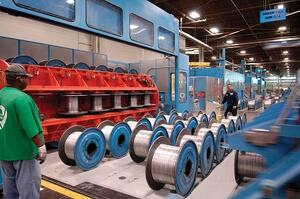 Despite digital transformation being seen as a critical issue at board-level, research from InfinityQS has revealed that organisations are failing to automate their quality management and data capture methods.
Despite digital transformation being seen as a critical issue at board-level, research from InfinityQS has revealed that organisations are failing to automate their quality management and data capture methods.
Many manufacturers still rely on time-consuming and labour-intensive manual procedures to collect information.
InfinityQS provides quality and process improvement software and services powered by an advanced Statistical Process Control (SPC) engine to manufacturers worldwide, specialising in the fields of food, beverage, life sciences, medical devices, and packaging.
Its solutions automate data collection and analysis during the manufacturing process, which allows its users to make real-time, process-improvement decisions and prevent defects before they occur.
Recently, InfinityQS conducted a survey with 260 manufacturers—including some of the world's largest manufacturing organisations—to gain insight into their needs, processes, and uses for data collection. The findings revealed that 75% of respondents are still employing manual approaches when it comes to managing their data collection procedures. The survey noted that 53% use spreadsheets to collect data and 47% still rely on pencil and paper.
Further to these findings, 77% of these manufacturers want to adopt automated data collection. This demonstrates the respondents' awareness surrounding the shortcomings of maintaining a manual approach to data collection – a key challenge they face in managing and processing data.
InfinityQS' findings match those of a recently released report from the Boston Consulting Group (BCG); Sprinting to Value in Industry 4.0. BCG uncovered the desire of manufacturers to adopt advanced digital industrial technology. However, BCG reported that manufacturers face a host of barriers to adoption including defining an effective implementation strategy and challenging cultural change within an organisation.
According to an InfinityQS spokesperson, a first step of Industry 4.0 adoption is technology to automate their data collection methods – an imperative to improve quality levels and optimise their manufacturing processes:
"The manufacturing sector is facing intense pressure to improve the way they manage product and engineering information from employees, customers, suppliers, and industry collaborators. Traditionally, a lot of information has lived in discrete systems with limited or restricted access. As a result, information can be difficult to find and cumbersome to digest, often supported with labour-intensive, manually operated, data collection procedures.
"Additionally, these data-capture methods are increasingly at risk from human error, and often detract from the real business of innovation, revenue growth, and customer satisfaction due to their time-consuming nature. For many manufacturers, this fact is not lost on them and that is why digital transformation is becoming such a critical conversation.
"Industry research, from the Cloud Industry Forum (CIF), suggests that 71% of firms either already have a digital transformation strategy in place or are in the process of implementing one – this is the same for the manufacturing industry. Changing employee expectations means staff need access to increasingly flexible IT infrastructures. This is particularly apparent in their demand for greater automation of data collection methods.
"The ability to gather and compare quality-related data from multiple sources is vital to making real-time decisions in manufacturing environments. This is something we've looked to address with our Data Management System (DMS), which automates information collection by standardising data from multiple sources and then writing that data into a centralised database. In doing so, the risk of variances within the quality-management and data collection procedures is dramatically reduced and therefore, the risk of recalls is also diminished.
"Looking to the future, as manufacturing firms start to reassess their current technological capabilities, the ability to automate critical actions will pave the way for other recognisable benefits such as increasing operational efficiency, improving product quality, and achieving significant cost savings. It's imperative that organisations look to address this now or risk being left behind by their more tech-savvy counterparts."

Add a Comment
No messages on this article yet